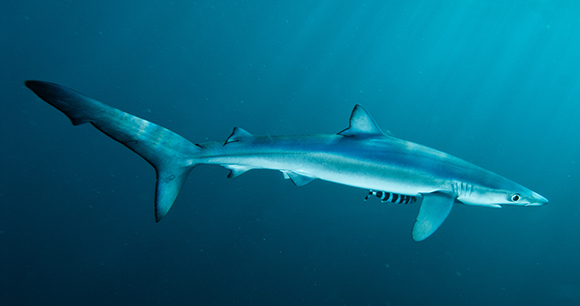
Washington, DC—The Animal Welfare Institute (AWI) applauds the US House of Representatives for passing the bipartisan Shark Fin Sales Elimination Act (H.R. 737) today. The bill would prohibit the sale, purchase, and possession of shark fins in the United States, helping to curb an inhumane global trade that claims the lives of 73 million sharks each year.
Introduced in January by Representatives Gregorio Kilili Camacho Sablan (I-MP) and Michael McCaul (R-TX), the bill passed by a vote of 310-107 after amassing 288 cosponsors. A companion measure in the Senate (S. 877), introduced by Senators Cory Booker (D-NJ) and Shelley Moore Capito (R-WV), passed out of committee earlier this year.
Shark finning is a cruel practice that entails cutting off a shark’s fins—often while the shark is still alive—and throwing the mutilated body in the ocean, where the helplessly immobile shark will suffocate, bleed to death, or succumb to an attack by a predator.
“Sharks have existed for hundreds of millions of years on this planet, and yet these remarkable apex predators now face one of the biggest threats to their survival because of the demand for their fins,” said AWI President Cathy Liss. “More than a quarter of shark species and their relatives are at risk of extinction. Passing legislation to clamp down on the global shark fin trade is essential if we are going to protect sharks and maintain functioning marine ecosystems. We are grateful to Representatives Sablan and McCaul for their steadfast leadership and urge the Senate to quickly pass the Shark Fin Sales Elimination Act so that it can be signed into law.”
Although tasteless, shark fins are considered a delicacy and used in traditional East Asian soups and other dishes. According to an online database maintained by AWI, nearly 200 restaurants across the country continue to offer shark fin products.
Congress has twice acted to curb the growing demand for shark fins. In 2000, Congress passed the Shark Finning Prohibition Act, which banned the possession of shark fins in US waters absent the rest of the shark’s body. And in 2010, Congress passed the Shark Conservation Act, requiring fishermen in US waters to bring sharks ashore whole, with their fins attached. Unfortunately, loopholes and lackluster enforcement have allowed shark finning to persist, with the United States playing a significant role in exporting fins around the world.
Twelve states and three territories have already enacted bans on selling shark fins in response to the dire threats facing sharks worldwide. In June, Canada, the largest importer of shark fins outside of Asia, banned shark fin imports and exports.
Margie Fishman, (202) 446-2128, [email protected]